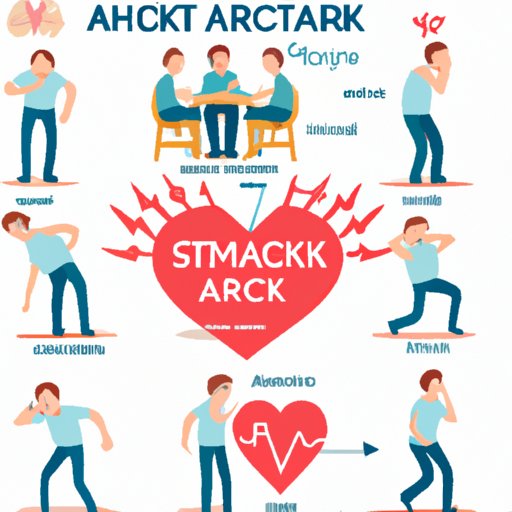
Can Symptoms of a Heart Attack Last for Days?
Heart attacks occur when the blood supply to the heart muscles is blocked, leading to damage to the muscles. It is a medical emergency that requires urgent medical attention. While the symptoms of a heart attack are well-known, some people may experience symptoms that can last for several days. This article aims to explore the science behind prolonged heart attack symptoms, warning signs of a heart attack, alternative ways to manage symptoms, personal survival stories, discussing the role of diet and exercise, tips for caregivers and loved ones, and expert medical opinions.
Science Behind Prolonged Heart Attack Symptoms
Not everyone who has a heart attack experiences symptoms that last for more than a day. However, for some people, the symptoms may persist for several days. This could be due to several risk factors, including age, sex, family history, lifestyle, and pre-existing medical conditions such as high blood pressure, diabetes, and high cholesterol levels. Studies have also shown that women, older adults, and people with diabetes are more likely to experience atypical symptoms or mild discomfort that can last for several days. Furthermore, the severity of the heart attack, the extent of damage to the heart muscles, and the speed of treatment can also influence the duration of the symptoms.
Warning Signs of a Heart Attack
Identifying the early warning signs of a heart attack can save lives. Some of the physical signs to look out for include chest pain or discomfort that may spread to the arms, neck, jaw, or back. Other symptoms may include shortness of breath, nausea, sweating, feeling lightheaded or dizzy, and sudden fatigue. Emotional signs such as feelings of anxiety, apprehension, or impending doom may also be present. If you or someone you know experiences any of these symptoms, seek immediate medical attention as it could be a heart attack.
Alternative Ways to Manage Heart Attack Symptoms
While medical treatment is essential in managing heart attack symptoms, some people have found alternative methods such as meditation, deep breathing, and relaxation techniques to be helpful. Other common treatments for heart attack symptoms include medications such as aspirin, beta-blockers, and cholesterol-lowering drugs. However, it is crucial to consult with a medical professional before trying any new methods or treatments.
Personal Survival Stories
Real-life accounts from heart attack survivors can be inspiring and informative. Survivors can share practical tips on what worked and what didn’t during their episode and provide encouragement and hope during the recovery process. Hearing from someone who has gone through a similar experience can be beneficial, especially for those who are recovering from a prolonged heart attack symptom.
Discussing the Role of Diet and Exercise
The relationship between diet, exercise, and heart health cannot be overstated. Eating a well-balanced diet that is low in saturated and Trans fats, and high in fiber can promote heart health. Regular physical activity, such as brisk walking, swimming, or cycling, can also reduce the risk of heart disease. Incorporating small changes into your daily routine, such as taking the stairs instead of the elevator, can also be a step towards a healthier heart.
Tips for Caregivers and Loved Ones
If you are a caregiver or a loved one of someone who has experienced a heart attack or prolonged symptoms, it is essential to know how to identify when someone is having a heart attack. It is also crucial to communicate effectively, providing emotional support during this challenging time. Having a plan in place for what to do in case of an emergency can also help to minimize stress levels.
Expert Medical Opinions
Medical professionals recommend seeking immediate medical attention if you or a loved one experiences symptoms of a heart attack. Medical treatments such as angioplasty and stents can help to open blocked arteries and restore blood flow to the heart muscles quickly. If left untreated, a heart attack can lead to serious complications, such as heart failure or cardiac arrest.
Conclusion
In conclusion, heart attacks are a medical emergency that requires prompt attention. Some individuals may experience prolonged symptoms that can last for more than a day due to various risk factors. Identifying early warning signs, seeking medical attention, and adopting a healthy lifestyle can reduce the risk of heart disease. Survivors of heart attack provide hope and inspiration to those going through a similar experience. Finally, it is essential to prioritize heart health and to seek medical attention if experiencing symptoms.




